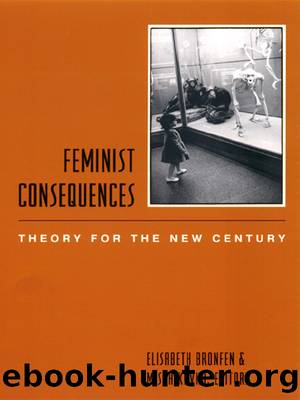Feminist Consequences by Bronfen Elisabeth; Kavka Misha;

Author:Bronfen, Elisabeth; Kavka, Misha;
Language: eng
Format: epub
Tags: PHI027000, Philosophy/Movements/Deconstruction, PHI034000, Philosophy/Social
Publisher: Columbia University Press
Published: 2001-02-06T16:00:00+00:00
Affirming the Law of the Father
Wondering why, “if boys in women’s dress are so threatening, did the English maintain a transvestite theater?” in contrast to all other European cultures, Stephen Orgel speculates that the cross between seductive fascination and terrifying anxiety played through by cross-dressing on the Shakespearean stage may well have at its core a cultural fear of women. Staging women in male attire renders them unnoticeable, even while it has recourse to a rhetorical ambivalence that can cut both ways. On the one hand the manifestation of a powerful cultural anxiety about disarming and controlling women, cross-dressing can alternatively serve as a “performative construction that both reveals the malleability of the masculine and empowers the feminine, enabling the potential masculinity of women to be realized and acknowledged, if safely contained within the theater’s walls.”19 This has led many critics to read cross-dressing as a subversive reinscription of the existing order, even if they do not necessarily agree whether this should ultimately be understood as a cementing of gender difference, its critical disruption, or a sublation of femininity into masculinity; indeed, critics at base disagree whether the subversive potentiality was limited to the action on stage or whether it was located precisely in the female audience watching the cross-dressed boy actors.20
In Twelfth Night, Viola, who has become the literary prototype for much subsequent female cross-dressing in drama as well as in opera,21 lands on the shores of Illyria after having been shipwrecked and forcibly separated from her twin brother, Sebastian. Though she accepts the law of fate that has so dramatically disrupted her journey to Elysium, she nevertheless has a choice in how to turn this accident to her favor, and the guise she chooses is that of a woman who hides her femininity by performing the part of a eunuch. “I prithee (and I’ll pay thee bounteously),” she explains to her servant, “Conceal me what I am, and be my aid/ For such disguise as haply shall become/ The form of my intent” (I.ii). At the same time, Viola, like many of her cross-dressed sisters, comes in the course of the play to support, albeit implicitly, the articulation of a desire which is precisely not aimed at heterosexual couple building. Though the happy ending of the Shakespearean comedy ultimately requires a recuperation of the distinction between the girl performing femininity and the girl performing the gendered hybridity of a eunuch, it nevertheless resonates with the loss of the far less regulated expression of sexual desire that had sustained our spectatorial enjoyment of this comedy of mistaken gendered identities. As in any other case of interpellation, something remains after the cut that transforms the individual into a subject, and this trace hovers, like a forlorn melancholic note, amidst the wedding bells that mark the successful recuperation of order at the end of all comic misrecognitions. While the women players once more come to hide the scar of this violent cut that severs them from their creative masculine refigurations, by
Download
This site does not store any files on its server. We only index and link to content provided by other sites. Please contact the content providers to delete copyright contents if any and email us, we'll remove relevant links or contents immediately.
| Anthropology | Archaeology |
| Philosophy | Politics & Government |
| Social Sciences | Sociology |
| Women's Studies |
On the Front Line with the Women Who Fight Back by Stacey Dooley(4311)
The Lonely City by Olivia Laing(4118)
The Rules Do Not Apply by Ariel Levy(3904)
Bluets by Maggie Nelson(3707)
The Confidence Code by Katty Kay(3566)
Three Women by Lisa Taddeo(2918)
Inferior by Angela Saini(2831)
A Woman Makes a Plan by Maye Musk(2828)
Pledged by Alexandra Robbins(2790)
Not a Diet Book by James Smith(2721)
Confessions of a Video Vixen by Karrine Steffans(2672)
Nice Girls Don't Get the Corner Office by Lois P. Frankel(2594)
Wild Words from Wild Women by Stephens Autumn(2587)
Brave by Rose McGowan(2500)
The Girl in the Spider's Web: A Lisbeth Salander novel, continuing Stieg Larsson's Millennium Series by Lagercrantz David(2379)
The Clitoral Truth: The Secret World at Your Fingertips by Rebecca Chalker(2242)
Why I Am Not a Feminist by Jessa Crispin(2238)
Women & Power by Mary Beard(2223)
Women on Top by Nancy Friday(2121)
